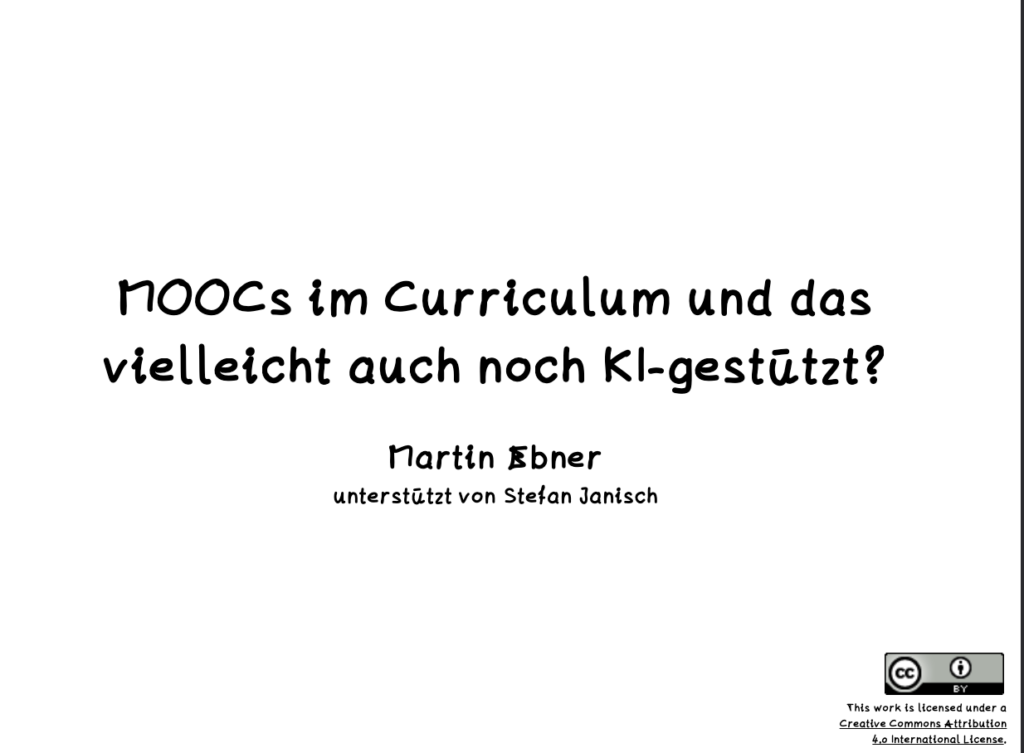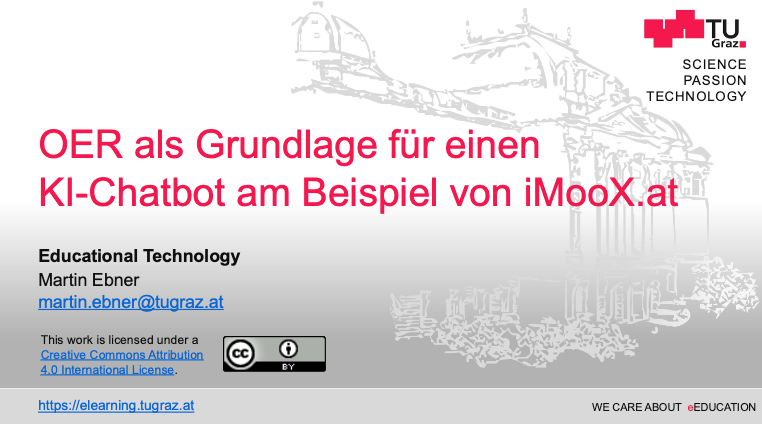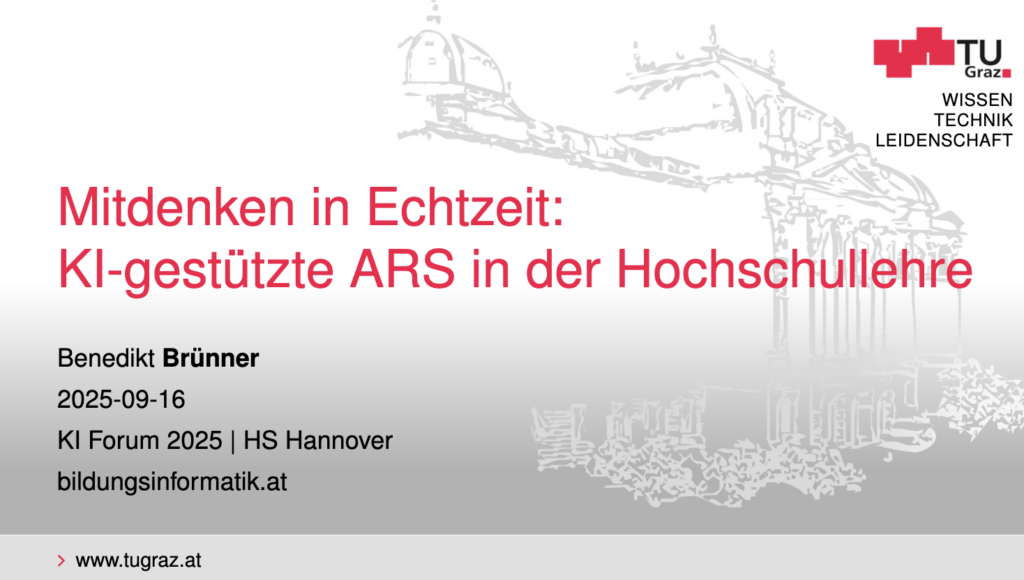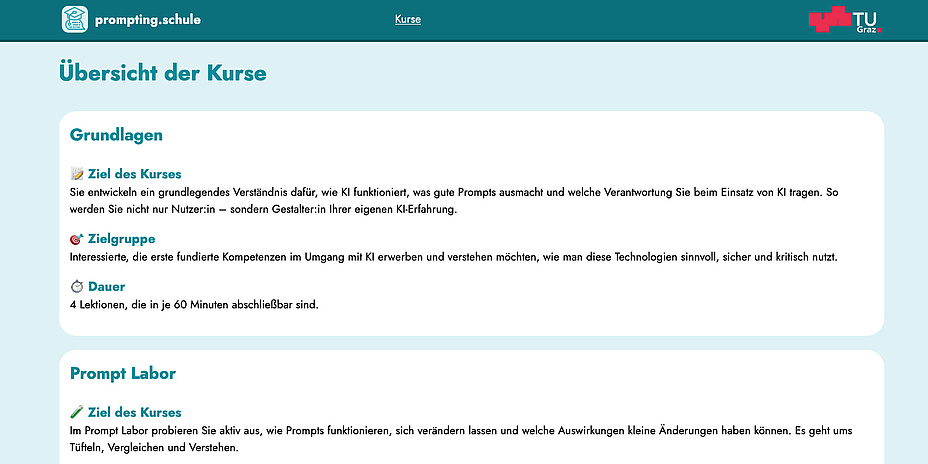Im Rahmen der Veranstaltung „Curricula entwickeln mit KI und anderen Tools“ von e-Teaching.org durfte ich einen Workshop zu „MOOCs im Curriculum und das vielleicht auch noch KI-gestützt?“ gestalten. Hier gibt es noch meine Folien nachgereicht:


Digitale Lehre an und rund um der Technischen Universität Graz
Im Rahmen der Veranstaltung „Curricula entwickeln mit KI und anderen Tools“ von e-Teaching.org durfte ich einen Workshop zu „MOOCs im Curriculum und das vielleicht auch noch KI-gestützt?“ gestalten. Hier gibt es noch meine Folien nachgereicht:

Im Rahmen der Veranstaltung „Online-Fachtagung: OER im Zeitalter von KI“ veranstaltet vom Multimedia Kontor Hamburg durfte ich Einblicke geben in den OER-Chatbot, welchen wir auf iMooX.at eingebettet haben:

Es freut mich ganz besonders, dass der erfolgreich EBmooc – die größte Erwachsenenbildungsmaßnahme in Österreich – wieder starten kann. Fast schon traditionell ist es wieder gelungen, dass CONEDU einen MOOC zu einem brandaktuellen Thema „KI-Workflows: Didaktik trifft Recht“ erstellt hat und diesen auf iMooX.at anbietet:
Der EBmooc 2025 widmet sich dem Einsatz von KI-gestützten Workflows (d.h. mehrstufigen Arbeitsabläufen) in der Erwachsenenbildung.
Teilnehmer*innen lernen anhand von praxisnahen Beispielen, wie sie KI didaktisch sinnvoll und rechtlich sicher einsetzen können, um ihre Arbeitsabläufe zu optimieren – und zwar in verschiedenen Kontexten, von der Kursgestaltung und -durchführung bis hin zu strategischen Entscheidungen. Sie erweitern ihr Verständnis von generativer KI und kennen die praktischen Auswirkungen des europäischen AI-Act auf die Erwachsenenbildung. Sie reflektieren ihren eigenen KI-Einsatz und ihre eigene Rolle als Erwachsenenbildner*in im Zuge der rasanten technologischen Entwicklungen.
Der Kurs richtet sich an Erwachsenenbildner*innen aus unterschiedlichen Einrichtungen, in unterschiedlichen Beschäftigungsformen und mit unterschiedlichen Aufgaben-Schwerpunkten: Training/Lehre/Unterricht, Bildungsmanagement/Programmplanung, Lernbegleitung und -betreuung.
Dieser MOOC ist eine praxisorientierte Weiterbildung, die Erwachsenenbildner*innen fit für die KI-gestützte Zukunft macht – rechtssicher, didaktisch fundiert und innovativ!
Hier gibt es noch den Trailer:
Wie alle bisherigen EBmoocs, ist auch diese Version absolut kostenfrei und wir freuen uns über jede Anmeldung: [Anmeldung zum kostenfreien EBmooc]
Es freut uns, dass der Standard unsere neuesten Ergebnisse im Bereich KI und Avatare aufgegriffen hat und einen kleinen Beitrag mit dem Titel „KI als Lehrer“ abgedruckt hat in der Ausgabe vom 17.09.205
Künstliche Intelligenz und Avatare in der Lehre haben den Standard beschäftigt. Die Zeitung hat darüber mit Sandra Schön von der Organisationseinheit Lehr- und Lerntechnologien gesprochen, wo ein Team untersucht hat, wie sich schulischer, aber auch universitärer Unterricht mithilfe digitaler Methoden sowie mit und durch KI gestalten lässt.
Wer sich gerne ein Bild davon machen möchte, wie die Avatare umgesetzt sind, ist herzlich eingeladen sich jederzeit kostenlos in diesen MOOC einzuschreiben: Open Educational Resources in Higher Education
Im Rahmen des KI-Forums in Hannover hat Benedikt einen Workshop zu „Mitdenken in Echtzeit: KI-gestützte ARS in der Hochschullehre“ gehalten:
Welche Chancen bietet Künstliche Intelligenz, um Hochschullehre interaktiver zu gestalten und individuelles Feedback zu fördern? In diesem Workshop erleben die Teilnehmenden den Einsatz von KI-basierten Audience Response Systemen (ARS) am Beispiel des Open-Source-Tools echoQuiz.eu. Sie erfahren, wie explorative Frageformate die aktive Teilnahme in synchronen Lehrveranstaltungen steigern und wie Lehrende durch KI in Echtzeit didaktisch unterstützt werden können. In diesem Workshop werden gemeinsam Fragen entwickelt, praktisch erprobt und didaktisch reflektiert.
Seine Folien sind hier zugänglich:

This is an impactful contributions, methodological rigor, and exceptional novelty in the research field of AI in education.
Our publication „Synthetic Educators: Analyzing AI-Driven Avatars in Digital Learning Environments“ at this year’s HCII conference is published.
Abstract:
Videos can be used in a variety of ways in learning environments today. With advances in generative AI technologies, tools such as HeyGen and ElevenLabs make it easy to create synthetic teachers, promising efficiency and accessibility. This study investigates the impact of AI-generated teaching video avatars on learners‘ emotional responses. A mixed-method approach was adopted, in which 55 participants were shown AI-generated videos and videos with real instructors. Emotional engagement was measured using FaceReader Online, along with quiz questions and follow-up interviews to gauge knowledge retention and perceptions of this educational technology. Results indicate that AI avatars effectively convey content and weakly elicit better recall rates and positive emotional responses comparable to those of real instructors. However, concerns were raised about emotional authenticity and engagement, highlighting the need for improved avatar design. The study concludes with a discussion of the potential and limitations of AI avatars and argues for their thoughtful integration to improve educational equity and learning outcomes.
[full article @ publisher’s homepage]
[draft @ researchgate]
Reference: Struger, P., Brünner, B., Ebner, M. (2025). Synthetic Educators: Analyzing AI-Driven Avatars in Digital Learning Environments. In: Smith, B.K., Borge, M. (eds) Learning and Collaboration Technologies. HCII 2025. Lecture Notes in Computer Science, vol 15807. Springer, Cham. https://doi.org/10.1007/978-3-031-93567-1_13
This is an impactful contributions, methodological rigor, and exceptional novelty in the research field of AI in education.
Our publication titled „InfoFit and Beyond: AI Chatbots as EdTech Tools for Self-Regulated Learning in MOOCs“ at this year’s HCII conference is available.
Abstract:
Massive Open Online Courses (MOOCs) have become essential for the democratization of education by providing accessible learning opportunities to broad audiences. However, their asynchronous and open structure is challenging for learning, especially in terms of maintaining engagement, and self-regulated learning (SRL) is necessary. This study investigates the integration of a retrieval-augmented-generation (RAG) chatbot into a MOOC and uses generative AI (genAI) to enhance learn-ers‘ SRL processes. The chatbot is based on Zimmermann’s SRL framework and is prepared for the MOOC content, basics of computer science. It is designed to support learners in the forethought, performance, and self-reflection phases by providing concise, context-specific responses. A mixed-method evaluation with 79 participants revealed high levels of satisfaction , with over 98% of respondents recommending the chatbot for future courses. The chatbot proved effective in supporting tasks such as summarization and concept clarification; however, its role in maintaining motivation emerged as a key area for further investigation. These findings underscore the transformative potential of AI chatbots in asynchronous learning environments, while also highlighting the importance of incorporating multimodal and motivational features to maximize educational technology (EdTech) impact.
[full article @ publisher’s homepage]
[draft @ ResearchGate]
Reference: Brünner, B., Ebner, M. (2025). InfoFit and Beyond: AI Chatbots as EdTech Tools for Self-Regulated Learning in MOOCs. In: Smith, B.K., Borge, M. (eds) Learning and Collaboration Technologies. HCII 2025. Lecture Notes in Computer Science, vol 15807. Springer, Cham. https://doi.org/10.1007/978-3-031-93567-1_4
This is an impactful contributions, methodological rigor, and exceptional novelty in the research field of AI in education.
Danke für einen kurzen Newsartikel über unsere promting.schule, die schön kurz die wesentliche Idee beschreibt:
„Neben einem grundlegenden Verständnis von generativer KI wollen wir den Nutzer*innen vor allem vermitteln, wie sie gut und effektiv prompten“, sagt Benedikt Brünner vom Institut Human Centred Computing der TU Graz, der an innovativen Lehrformaten rund um KI forscht.

Alles natürlich offen und frei zugänglich: [Link zur prompting-Schule]
Viel Spaß beim Mitmachen und wir freuen uns natürlich über Feedback bzw. wenn jemand selbst einen „Kurs“ zur Verfügung stellen möchte für eine bestimmte Zielgruppe, bitte gerne melden.
Achja, hier natürlich der Link zum Newsartikel auf der TU Graz Homepage.
At this year’s EDMedia conference, we published a publication titled „Rapid Multilingual Video Production utilizing Artificial Intelligence„.
Abstract:
This study presents the Rapid Multilingual Video Production (RMVPro) framework, an optimized process for creating high-quality multilingual educational videos using artificial intelligence (AI). The framework involves three stages: planning, translation, and production, with each stage involving iterative feedback loops with experts and native speakers to ensure linguistic and cultural accuracy of the translations. The framework for the Multilingual Video Sprint was tested during an international conference and the produced multilingual videos showing an AI human avatar were evaluated in a MOOC with feedback from 128 students. Results showed that AI could be utilized to accelerate video production while maintaining the clarity and comprehensibility of educational content. However, feedback indicated mixed perceptions of AI-generated human avatars, with some students preferring human facilitators for reasons of authenticity. The use of AI avatars in multilingual educational videos must be implemented carefully, but the RMVPro framework ensures high quality while utilizing the potential of AI to rapidly produce multilingual educational videos.
[draft @ researchgate]
[full version @ conference website]
Reference: Brünner, B. & Ebner, M. (2025). Rapid Multilingual Video Production utilizing Artificial Intelligence. In T. Bastiaens (Ed.), Proceedings of EdMedia + Innovate Learning (pp. 1223-1230). Barcelona, Spain: Association for the Advancement of Computing in Education (AACE). Retrieved May 28, 2025 from https://www.learntechlib.org/primary/p/226280/.